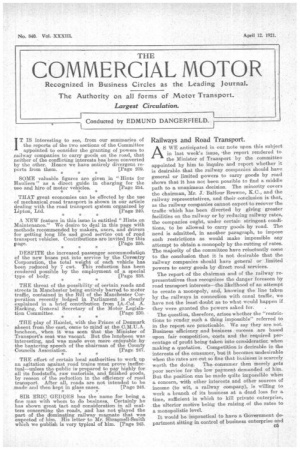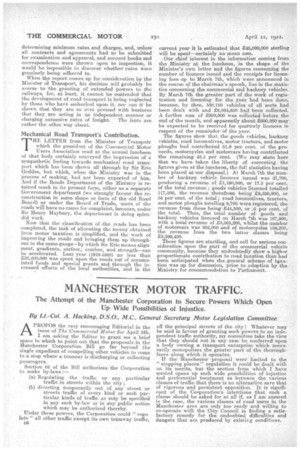I T IS interesting to see, from our summaries of the
Page 1

Page 2

If you've noticed an error in this article please click here to report it so we can fix it.
reports of the two sections of the Committee appointed to consider the granting of powers to railway companies to carry goods on the road, that neither of the conflicting interests has been converted by the other. Hence we have entirely divergent re ports from them. [Page 238.
SOME valuable figures are given in "Hints for Hauliers" as a direct guide in charging for the use and hire of motor vehicles. [Page 254.
THAT great economies can be effected by the use of mechanical road transport is shown in our article dealing with the road transport system organized by Lipton, Ltd. [Page 240.
A NEW feature in this issue is entitled "Hints on Maintenance." We desire to deal in this page with methods recommended by makers, users, and drivers for getting long life and good service out of road transport vehicles. Contributions, are invited for this page. Rage 258.
DESPITE the increased passenger accommodation of the new buses put into service by the Coventry Corporation, the total weight of each vehicle has been reduced by 7 cwt. This reduction has been , rendered possible by the employment of a special type of body. [Page 238.
THE threat of the possibility of certain roads and streets in Manchester being entirely barred to motor traffic, contained in the Bill of the Manchester Corporation recently lodged in Parliament is clearly explained in a brief contribution from Lt.-Col. A. Hacking, General Secretary of the Meter Legisla tion Committee. (Page 230.
THE play of Hamlet, with the 'Prince of Denmark absent from the east, came to mind at the C.M.U.A. luncheon when it was seen that the Minister of Transport's seat was vacant. But the luncheon was interesting, and was made even more enjoyable by the bantering speech of the chairman of the County Councils Association. [Page 247.
THE effort of certain local authorities to work up an agitation against road trains must prove ineffectual—unless the public is, prepared to payhighly for all its foodstuffs, raw materials, and firiiihed goods, by reason of the reduction in the efficiency of road transport. After all, roads are not intended to be made and then kept in glass cases. [Page 248.
SIR ERIC GEDDES has the name for being a fine man with whom to do business. Certainly he has shown great tact and consideration in all matters concerning the roads, and has not played the part of the dominating railway magnate that was expected of him. His letter to Mr. Shrapnell-Smith which we publish is very typical of him. [Page 245.
Railways and Road Transport.
AS WE anticipated in our, note upon this subject in last week's issue, -the report rendered to the Minister of Transport by the committee appointed by him to inquire and report whether it is desirable that the railway companies should have general or limited powers to carry goods by road shows that it has not been possible to find a middle path to a unanimous decision. The minority covers the chairman, Mr. J. Balfour Browne, L.C., and the railway representatives, and their ooricluaion is that, as the railway companies cannot expect to recover the traffic which has been diverted by giving greater facilities on the railway or by reducing railway rates, the companies ought, under certain stringent conditions, to be allowed to carry goods by road. The need is admitted, in another paragraph, to impose such restrictions as would make impossible any attempt to obtain a monopoly by the cutting of rates. The majority of -the committee have reluctantly come to the conclusion that it is not desirable that the railway companies should have genera] or limited powers to carry goods by direct road services.
The report,of the chairman and of the railway representatives thus recognizes the danger foreseen by road transport interests--the likelihood of an attempt to create a monopoly, and, knowing the line taken by the railways in connection with canal traffic, we have not the least doubt as to what would happen if they were granted the powers asked for. _ The question, therefore, arises whether the "restricflans to render such a. thing impossible" referred to in the report are practicable. We say they are not. Business efficiency and business success are based upon fair competition, costs and the required percentage of profit being taken into consideration when making a quotation. Competition is desirable in the interests of the consumer, but it becomes undesirable When the rates are cut so fine that business is scarcely worth the doing. The consumer then merely gets poor service for the low payment demanded of him. But the position can be made quite impossible when a concern, with other interests and other sources of income (to 'wit, a railway company), is willing to work a branch of its business at a dead loos for a time, sufficient in which to kill private enterprise, the ulterior motive being the raising.of the rates to a monopolistic level.
It would be impractical to have a Government department sitting in control of business enterprise and determining minimum rates and charges, and, unless all contracts and agreements had to be submitted for examination and approval, and account books and correspondence were thrown open to inspection, it would be impossible to discover whether rates were genuinely being adhered to.
When the report conies up for consideration by the Minister o:f Transport, his decision will probably be averse to the granting of extended powers to the railways, for, at least, it cannot be contended that the development of road transport is being neglected by those who have embarked uponit, nor can it be shown that they are so over itressed with business that they are acting in an independent manner -or charging excessive rates of freight. The facts are rather the other, way about.
Mechanical Road Transport's Contribution.
THE LETTER from the Minister of Transpotr which the president of the Commercial Motor Users Association read at the annual luncheon of that body certainly conveyed the impression of a sympathetic feeling towards mechanical read transport which has been shown all through by Sir Eric Ged-des, but which, when the Ministry was in the process of making, had not been expected of him. And if the Roads Department of the Ministry is retained much in its present. form, either as a separate 'Government department (we strongly favour the reconstruction in some shape or form of the old Road Board) or under the Board of Trade, users of the roads will have no cause for complaint, because, under Sir Henry Maybury, the department is doing splen did work. .
Now that the classification of -the re-ads has been completed, the task of allocating the money obtained from motor taxation is simplified, and the work of improving the roads and bringing them up throughout to the same gauge—by which Sir Eric means alignment, gradients, surface, camber, and strength—can be accelerated. Last year (1919-1920) no less than £33,400,000 was spent upon the roads out of accumulated funds and special grants and through the increased efforts of the local authorities, and in the current year it is estimated that £45,000,000 sterling will be spent—certainly no mean sum. Our chief interest in the information coming from the Ministry at the luncheon, in the shape of the Minister's own letter and the figures conoerning the number of licences issued and the receipts for licensing fees up to March tth, which were announced in the course of the chairman's speech, lies in the statistics concerning the commercial and hackney vehicles. By March 7th the greater part of the work of registration and licensing for the year had been done, because, by then, 556,100 vehicles of all sorts had been . dealt with and 26,864,650 had been collected. A further sum of 2900,000 was collected -before the end of the month, and apparently about £600,000 may be expected to be received for quarterly licences in respect of the remainder of the year.
The figures show that the goods vehicles, hackney vehicles, road locomotives, motor tractors, and motor ploughs had contributed 51.9 per cent, of the proceeds, motorcycles andmotorcars having contributed the remaining 48.1 per cent. (We may state here that we have taken the liberty Of -correcting the figures given at the luncheon, the full statistics having been placed at our disposal.) At March 7th the number of hackney vehicle licences issued was 41,700, producing a revenue of £1,190,500, or 17.3 per cent. of the total revenue; floods vehicles licensed totalled 117,500, the revenue therefrom being 22,330,200, or 34 per cent, of the total; road locomotives, tractors, and motor plouglis totalling 8,700 were registered, the revenue from these being 244,50.0, or .6 per cent, of the total. Thus, the total. number of goods and hackney vehicles licensed on March 7th was 167,900, with a total revenue of £3,565,200, whilst the number of motorcars was 202,000 and of motorcycles 186,200, the revenue from the two latter classes being 23,299,450.
These figures are startling, and call for serious consideration upon the part of the commercial vehicle community, because they undoubtedly show a higher proportionate contribution to road taxation than had been anticipated when the general scheme of taxation was up for discussion, prior to adoption by the Ministry for recommendation to Parliament.
































